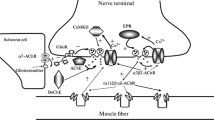Summary
Intense salivatory reactions to atropine appear only at the second and are completely at the third stage of the postdenervational syndrome. Muscarinic receptors, emerging at these stages of denervation and causing paradoxical reactions to cholinolytics, differ from those which emerge at the first stage of denervation and from those blocked with atropine. A classical antagonist, atropine is able to discriminate between heterogenous subpopulations of these receptors, emerging at various stages of denervation. The denervated parotid gland presents, an evolving system in terms of muscarinic receptors. Atropine discriminates between the highest levels in the development of those structures and the lowest ones, since for the former it plays the role of an antagonist, and for the latter the role of an agonist.
Similar content being viewed by others
References
Ariens EJ, Beed AJ, Rodrigios JF (1979) The pharmacon receptor-effector concept. In: O'Braine KD (ed) The receptors, vol 1. Academic Press, New York, pp 33–92
Barlow RB, Burston VN, Vis A (1980) Three types of muscarinic receptors: Br J Pharmacol 68: 141–142
Berrie CP, Birdsall NJM, Hulme EG, Keen, M., Stockton JM, Wheatly M (1986) Muscarinic receptor subclasses. The binding properties of the soluble receptor binding sites. In: Subtypes of muscarinic receptors 2. TIPS [Suppl] 7: 8–13
Fambrough DM (1979) Control of acetylcholine receptors in skeletal muscle. Physiol Rev 59: 165–227
Gramp W, Harris JB, Thesleff S (1972) Inhibition of denervation changes in skeletal muscle by blockers of protein synthesis. J Physiol (Lond) 221: 743–754
Hammer R, Giachetti A (1982) Muscarinic receptor subtypes: M1 M2. Biochemical and functional characterization. Life Sci 31: 2991–2998
Hedlund B, Abens J, Bartfai T (1983) Chronic atropine treatment induces supersensitivity of VIP receptors and of muscarinic receptors in the rat salivary gland. Science 220: 519–521
Khromov-Borisov NV (1975) Short course of molecular pharmacology, 2nd edn. Second Medical Institute, Moscow (Russian)
Levin SL (1948) Atropine as a stimulator of salivation. Bull Exp Biol Med USSR 25: 280–283
Levin SL (1956) Some data concerning salivation of the partially denervated human parotid gland. J Physiol USSR 42: 390–397
Levin SL (1979) Immediate transformation of a cholinonegative atropine effect into a cholinopositive one in the denervated human salivary gland by reflex stimulation. Gen Pharmacol 10: 475–476
Levin SL (1983) Dissociation of the functioning of a human parotid gland following trauma of the tympanic nerve (a pseudocolchicine phenomenon). Clin Pharmacol Res 3: 311–321
Levin SL (1984) Effect of denervation on parotid gland function. Ann Otol Rhinol Laryngol 93: 176–178
Levin SL (1985) On the second principle of the law of denervation. Ann Med Acad Sci USSR 10: 78
Levin SL (1986) Disputable issues in cholinergic regulation of the salivary parotid gland and its evolution. Clin Pharmacol Res 6: 339–341
Natelson S (1957) Microtechniques of clinical chemistry for the routine laboratory. Thomas, Springfield, OH
North RA, Slack BE (1985) Surprenant A. Muscarinic M2 and M2 receptors mediate depolarization and presynaptic inhibition in guinea-pig enteric nervous system. J Physiol 368: 435–452
Poskonova MA, Balezina OP (1972) On the mechanism of emergence of extrasynaptic cholinoreceptor. Rep Acad Sci USSR 206: 254–256
Schales O, Schales S (1941) J Biol Chem 140: 879
Author information
Authors and Affiliations
Rights and permissions
About this article
Cite this article
Levin, S.L. The bimodal effect of cholinergic blocking agents on the human parotid gland deprived of parasympathetic control. J. Neural Transmission 73, 239–247 (1988). https://doi.org/10.1007/BF01250139
Received:
Accepted:
Issue Date:
DOI: https://doi.org/10.1007/BF01250139




